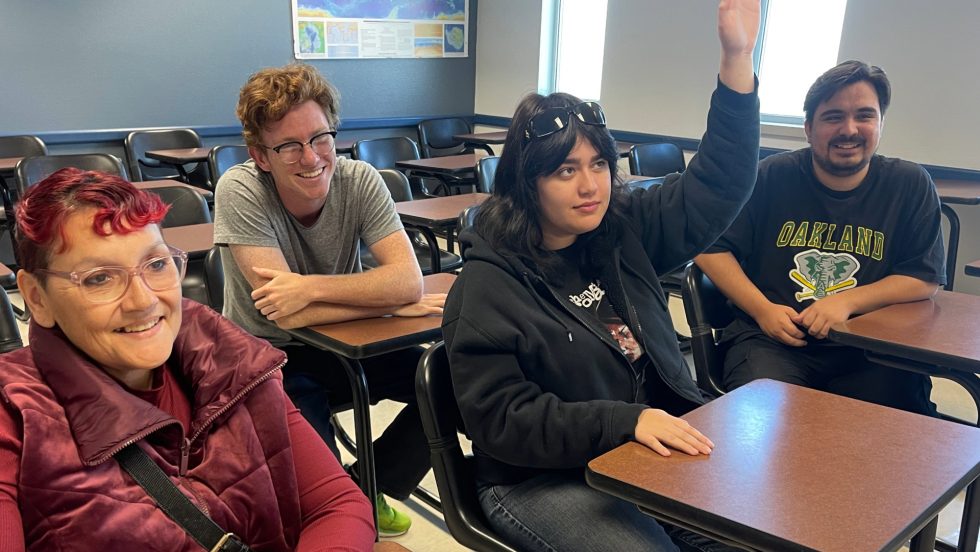Political Science
Program Description
Politics is all around us. Aristotle called it the “master science” because it influences all aspects of human life: what we can do, what we can say, where we can live, and even what we can eat. There is no escaping politics, but we can discover more effective ways to use it by studying political science. Political science is a broad discipline encompassing American politics, comparative politics, international relations, political theory, and law. It explores how individuals exercise power in group settings and the institutions, rules, and processes put in place to promote cooperation.
Degrees/Certificates
Merced College offers the following degrees/certificates in Political Science:
Political Science (AAT)
Why major in Political Science at Merced College?
The Political Science Department at Merced College offers enriching courses that help students to understand current events in a larger context. Our survey classes cover the subfields of American politics, comparative politics, international relations, political theory, and research methods.
Political science students develop a unique skill set that is attractive to employers and valuable for any job. Our course offerings foster and create a wide array of skills, including:
- Oral and written communication skills
- An understanding of research methodologies and statistics
- Critical and logical thinking skills
- An ability to identify community needs and solutions
- Knowledge of government laws, regulations, and processes
- Insight into human behavior and organizational dynamics
- Leadership and communication skills
Career Opportunities
Almost 17 percent of all jobs in the United States are in federal, state, or local government positions. Positions vary widely from city council representatives, communications directors, and staffers to elected representatives, city planners, state or federal agency employees (environmental protection, education, etc.), and numerous other positions. Most government jobs have decent pay and excellent benefits (health care, retirement plans, etc.).
Many political science graduates work in political fields outside the government. Some examples include working for groups advocating for immigrant rights, stronger environmental protections, or greater individual liberties. There are millions of community and political advocacy groups across the United States. Each year some Political Science students also strike out on their own and establish new political organizations. Social media and new technological developments provide incredibly fertile grounds for political entrepreneurs.
Political science provides excellent preparation for work in the U.S. State Department, Foreign Service, and other agencies oriented toward foreign affairs. It also prepares students for employment with the millions of NGOs (non-governmental organizations) working worldwide on public health, economic development, political development, and security.
Policy analysts propose new public policies, regulations, and laws and assess the impact of existing ones. They may work in government agencies or for non-government organizations. Some businesses also employ policy analysts to study how regulations affect them and propose legislation changes.
Lobbyists work on behalf of businesses and other organizations (ranging from oil companies to environmental groups, the Chamber of Commerce to labor organizations, and even churches and charities) to persuade legislators to pass laws that would benefit their group. Lobbyists often alert lawmakers to how some law or regulation might negatively affect some constituents. Many lobbyists begin working as elected officials’ staffers and then move into private careers. Government liaison specialists work for companies to manage relations with governmental agencies and ensure compliance with government regulations.
Many political science students go to law school and enter legal careers. Some go to work for the government as district attorneys, judges, or military lawyers or in government agencies such as the FBI or IRS. Many go into private practice, while some work for large corporate firms or NGOs.
Not everyone who wants to go into business needs a business degree. There are many advantages for those who want to work in the industry to study political science. Political science equips students to understand the political institutions and laws that govern all business functions. It also sharpens students’ organizational dynamics and human relations knowledge and hones their writing, communication, and statistical skills. A degree in Political Science can lead to a career in banking, advertising, human relations, multinational corporations, international trading companies, and private contractors with links to government, among other business fields.
Because most political scientists are interested in people and, in many cases, want to improve society, many tend to gravitate toward teaching. A political science degree provides an excellent background for teaching various topics. A graduate degree or Ph.D. is necessary to teach at the college level. Students with a degree in political science can also go directly into private and charter school teaching.
Political Science Faculty
-
Jennifer Mendez
ProfessorHistory Political Science -
Richard G Randall
ProfessorPolitical Science
